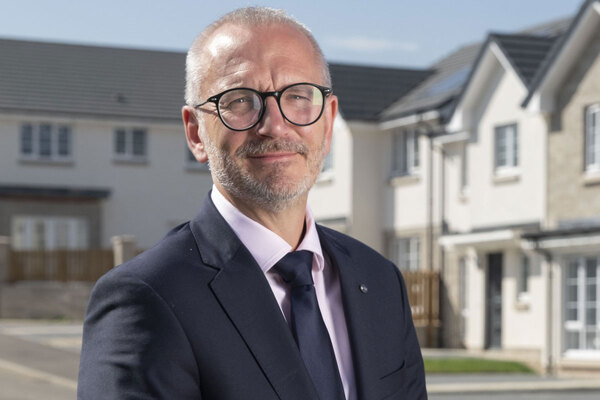You are viewing 1 of your 1 free articles
We need legal duty to prevent homelessness, says NIHE chief executive
A legal duty should be placed on the Northern Ireland Housing Executive (NIHE) to prevent homelessness, its chief executive has said.

Speaking to Inside Housing, Grainia Long reiterated the organisation’s call, given the pressures on homelessness services and with the government restored, for the Housing Executive to get the “funding and the resource – the people, time and money – into prevention”.
As it stands, the 85,000-home organisation, which also has responsibility for homelessness services, is not legally obliged to prevent homelessness, unlike in England where there is a prevention duty on councils.
One in 34 people in Northern Ireland are legally classified as homeless, including 4,500 children.
There are more than 46,000 households – 86,000 individuals – on the social housing waiting list.
The NIHE made the same call last year, although there was no working Northern Ireland executive in place at the time.
The executive got back up and running last month after nearly two years. Power-sharing collapsed after former DUP first minister Paul Givan resigned in February 2022 in protest against the Northern Ireland Protocol.
Ms Long told Inside Housing that she would now like to see “a lot of focus” on prevention.
She said: “We need a strategic shift towards prevention and our homelessness strategy was very, very clear that we need a strategic shift towards prevention.
“Because that would require a fundamentally different way of setting our budget for homelessness, we’ve called for a legal duty on the Housing Executive to prevent homelessness, which we don’t currently have.
“I must be one of the rare chief executives to actually ask for more obligations but it’s important that we do, it’s the right thing to do.”
Inside Housing has contacted the Department for Communities for comment.
Ms Long said that another area affected by the lack of government was decarbonisation. The Northern Ireland Federation of Housing Associations previously warned that in the absence of a functioning executive, the country was in danger of falling even further behind in terms of insulation and retrofitting of stock.
Ms Long said the Housing Executive has a “really good story to tell” in terms of having itself “proactively invested in retrofit and doing that on the basis of data and evidence”.
One of its previous retrofit projects was award-winning. However, she said: “Not having ministers has meant we’re not where I would want us to be. I think if we’d had ministers for that period, we would have had – I hope – a large-scale retrofit programme agreed, signed off and ready to go.
“The risk is you end up with a capacity gap in the industry, that we lose skills and we lose knowledge to Scotland and to the Republic of Ireland.
“I think that wouldn’t be a surprise to anyone. It’s the larger-scale transformation, the systemic change that ministers drive that we’ve been missing.”
The Housing Executive is aiming to undergo a restructure in the next few years. Plans for the change, in the works for years, were officially announced by ministers in November 2020.
The main change will be focus on borrowing.
Among other benefits, it would allow the landlord to scale up development.
The authority recently broke ground on its first development in more than 20 years, a pilot scheme of six homes being built to Passivhaus standard.
Between 1975 and 1996, it built more than 80,000 homes, but has not developed at any scale since 2001-02, when housing associations became the main providers of new social housing in the region.
On development plans in future, Ms Long said the landlord will have to start by looking at its own capacity in terms of its assets and land assets, and looking at the areas of need.
“The next phase is to go beyond those six [homes] to hopefully do work like this in every council area where there is housing need.
“To go beyond that pilot relatively quickly through strategic partnerships with councils, whether it’s land partnerships or other types of partnership,” she said.
However, Ms Long added that the Housing Executive will continue to “get the balance right” in terms of investment in existing and new homes.
She said: “You don’t go from not developing for 21 years to suddenly developing, so what we won’t be is unrealistic in our ambitions and be really, really clear here that we will go at the pace that our future borrowing allows us to do fundamentally.
“We certainly will continue to get the balance right between development and housing management. We have a huge investment requirement in terms of our stock. We have to decarbonise our stock, we are on the front foot in terms of planning for building safety legislation. We have to get that right.”
Sign up for our Northern Ireland bulletin
Already have an account? Click here to manage your newsletters











